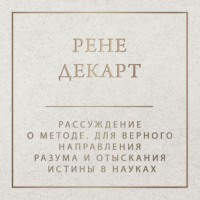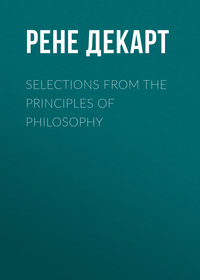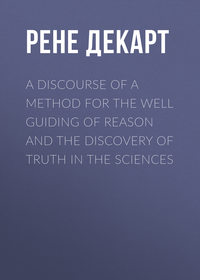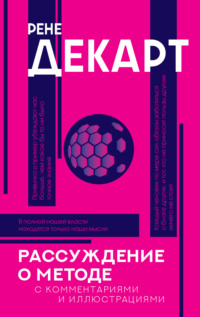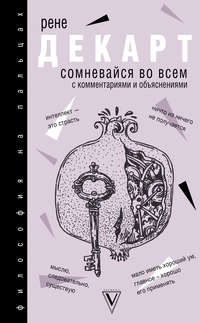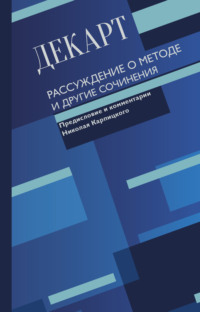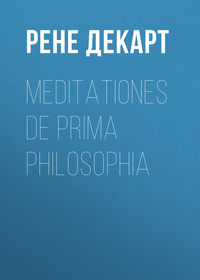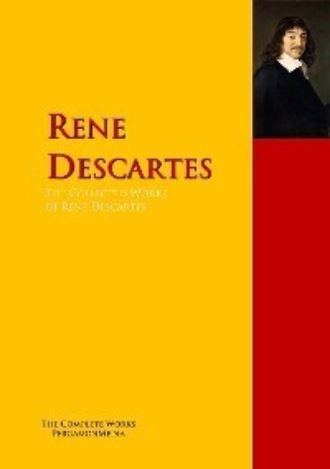
Полная версия
The Collected Works of Rene Descartes

The Collected Works of Rene Descartes
The Complete Works PergamonMedia
PREFATORY NOTE BY THE AUTHOR
If this Discourse appear too long to be read at once, it may be divided into six Parts: and, in the first, will be found various considerations touching the Sciences; in the second, the principal rules of the Method which the Author has discovered, in the third, certain of the rules of Morals which he has deduced from this Method; in the fourth, the reasonings by which he establishes the existence of God and of the Human Soul, which are the foundations of his Metaphysic; in the fifth, the order of the Physical questions which he has investigated, and, in particular, the explication of the motion of the heart and of some other difficulties pertaining to Medicine, as also the difference between the soul of man and that of the brutes; and, in the last, what the Author believes to be required in order to greater advancement in the investigation of Nature than has yet been made, with the reasons that have induced him to write.
PART I
Good sense is, of all things among men, the most equally distributed; for every one thinks himself so abundantly provided with it, that those even who are the most difficult to satisfy in everything else, do not usually desire a larger measure of this quality than they already possess. And in this it is not likely that all are mistaken the conviction is rather to be held as testifying that the power of judging aright and of distinguishing truth from error, which is properly what is called good sense or reason, is by nature equal in all men; and that the diversity of our opinions, consequently, does not arise from some being endowed with a larger share of reason than others, but solely from this, that we conduct our thoughts along different ways, and do not fix our attention on the same objects. For to be possessed of a vigorous mind is not enough; the prime requisite is rightly to apply it. The greatest minds, as they are capable of the highest excellences, are open likewise to the greatest aberrations; and those who travel very slowly may yet make far greater progress, provided they keep always to the straight road, than those who, while they run, forsake it.
For myself, I have never fancied my mind to be in any respect more perfect than those of the generality; on the contrary, I have often wished that I were equal to some others in promptitude of thought, or in clearness and distinctness of imagination, or in fullness and readiness of memory. And besides these, I know of no other qualities that contribute to the perfection of the mind; for as to the reason or sense, inasmuch as it is that alone which constitutes us men, and distinguishes us from the brutes, I am disposed to believe that it is to be found complete in each individual; and on this point to adopt the common opinion of philosophers, who say that the difference of greater and less holds only among the accidents, and not among the forms or natures of individuals of the same species.
I will not hesitate, however, to avow my belief that it has been my singular good fortune to have very early in life fallen in with certain tracks which have conducted me to considerations and maxims, of which I have formed a method that gives me the means, as I think, of gradually augmenting my knowledge, and of raising it by little and little to the highest point which the mediocrity of my talents and the brief duration of my life will permit me to reach. For I have already reaped from it such fruits that, although I have been accustomed to think lowly enough of myself, and although when I look with the eye of a philosopher at the varied courses and pursuits of mankind at large, I find scarcely one which does not appear in vain and useless, I nevertheless derive the highest satisfaction from the progress I conceive myself to have already made in the search after truth, and cannot help entertaining such expectations of the future as to believe that if, among the occupations of men as men, there is any one really excellent and important, it is that which I have chosen.
After all, it is possible I may be mistaken; and it is but a little copper and glass, perhaps, that I take for gold and diamonds. I know how very liable we are to delusion in what relates to ourselves, and also how much the judgments of our friends are to be suspected when given in our favor. But I shall endeavor in this discourse to describe the paths I have followed, and to delineate my life as in a picture, in order that each one may also be able to judge of them for himself, and that in the general opinion entertained of them, as gathered from current report, I myself may have a new help towards instruction to be added to those I have been in the habit of employing.
My present design, then, is not to teach the method which each ought to follow for the right conduct of his reason, but solely to describe the way in which I have endeavored to conduct my own. They who set themselves to give precepts must of course regard themselves as possessed of greater skill than those to whom they prescribe; and if they err in the slightest particular, they subject themselves to censure. But as this tract is put forth merely as a history, or, if you will, as a tale, in which, amid some examples worthy of imitation, there will be found, perhaps, as many more which it were advisable not to follow, I hope it will prove useful to some without being hurtful to any, and that my openness will find some favor with all.
From my childhood, I have been familiar with letters; and as I was given to believe that by their help a clear and certain knowledge of all that is useful in life might be acquired, I was ardently desirous of instruction. But as soon as I had finished the entire course of study, at the close of which it is customary to be admitted into the order of the learned, I completely changed my opinion. For I found myself involved in so many doubts and errors, that I was convinced I had advanced no farther in all my attempts at learning, than the discovery at every turn of my own ignorance. And yet I was studying in one of the most celebrated schools in Europe, in which I thought there must be learned men, if such were anywhere to be found. I had been taught all that others learned there; and not contented with the sciences actually taught us, I had, in addition, read all the books that had fallen into my hands, treating of such branches as are esteemed the most curious and rare. I knew the judgment which others had formed of me; and I did not find that I was considered inferior to my fellows, although there were among them some who were already marked out to fill the places of our instructors. And, in fine, our age appeared to me as flourishing, and as fertile in powerful minds as any preceding one. I was thus led to take the liberty of judging of all other men by myself, and of concluding that there was no science in existence that was of such a nature as I had previously been given to believe.
I still continued, however, to hold in esteem the studies of the schools. I was aware that the languages taught in them are necessary to the understanding of the writings of the ancients; that the grace of fable stirs the mind; that the memorable deeds of history elevate it; and, if read with discretion, aid in forming the judgment; that the perusal of all excellent books is, as it were, to interview with the noblest men of past ages, who have written them, and even a studied interview, in which are discovered to us only their choicest thoughts; that eloquence has incomparable force and beauty; that poesy has its ravishing graces and delights; that in the mathematics there are many refined discoveries eminently suited to gratify the inquisitive, as well as further all the arts an lessen the labour of man; that numerous highly useful precepts and exhortations to virtue are contained in treatises on morals; that theology points out the path to heaven; that philosophy affords the means of discoursing with an appearance of truth on all matters, and commands the admiration of the more simple; that jurisprudence, medicine, and the other sciences, secure for their cultivators honors and riches; and, in fine, that it is useful to bestow some attention upon all, even upon those abounding the most in superstition and error, that we may be in a position to determine their real value, and guard against being deceived.
But I believed that I had already given sufficient time to languages, and likewise to the reading of the writings of the ancients, to their histories and fables. For to hold converse with those of other ages and to travel, are almost the same thing. It is useful to know something of the manners of different nations, that we may be enabled to form a more correct judgment regarding our own, and be prevented from thinking that everything contrary to our customs is ridiculous and irrational, a conclusion usually come to by those whose experience has been limited to their own country. On the other hand, when too much time is occupied in traveling, we become strangers to our native country; and the over curious in the customs of the past are generally ignorant of those of the present. Besides, fictitious narratives lead us to imagine the possibility of many events that are impossible; and even the most faithful histories, if they do not wholly misrepresent matters, or exaggerate their importance to render the account of them more worthy of perusal, omit, at least, almost always the meanest and least striking of the attendant circumstances; hence it happens that the remainder does not represent the truth, and that such as regulate their conduct by examples drawn from this source, are apt to fall into the extravagances of the knight-errants of romance, and to entertain projects that exceed their powers.
I esteemed eloquence highly, and was in raptures with poesy; but I thought that both were gifts of nature rather than fruits of study. Those in whom the faculty of reason is predominant, and who most skillfully dispose their thoughts with a view to render them clear and intelligible, are always the best able to persuade others of the truth of what they lay down, though they should speak only in the language of Lower Brittany, and be wholly ignorant of the rules of rhetoric; and those whose minds are stored with the most agreeable fancies, and who can give expression to them with the greatest embellishment and harmony, are still the best poets, though unacquainted with the art of poetry.
I was especially delighted with the mathematics, on account of the certitude and evidence of their reasonings; but I had not as yet a precise knowledge of their true use; and thinking that they but contributed to the advancement of the mechanical arts, I was astonished that foundations, so strong and solid, should have had no loftier superstructure reared on them. On the other hand, I compared the disquisitions of the ancient moralists to very towering and magnificent palaces with no better foundation than sand and mud: they laud the virtues very highly, and exhibit them as estimable far above anything on earth; but they give us no adequate criterion of virtue, and frequently that which they designate with so fine a name is but apathy, or pride, or despair, or parricide.
I revered our theology, and aspired as much as any one to reach heaven: but being given assuredly to understand that the way is not less open to the most ignorant than to the most learned, and that the revealed truths which lead to heaven are above our comprehension, I did not presume to subject them to the impotency of my reason; and I thought that in order competently to undertake their examination, there was need of some special help from heaven, and of being more than man.
Of philosophy I will say nothing, except that when I saw that it had been cultivated for many ages by the most distinguished men, and that yet there is not a single matter within its sphere which is not still in dispute, and nothing, therefore, which is above doubt, I did not presume to anticipate that my success would be greater in it than that of others; and further, when I considered the number of conflicting opinions touching a single matter that may be upheld by learned men, while there can be but one true, I reckoned as well-nigh false all that was only probable.
As to the other sciences, inasmuch as these borrow their principles from philosophy, I judged that no solid superstructures could be reared on foundations so infirm; and neither the honor nor the gain held out by them was sufficient to determine me to their cultivation: for I was not, thank Heaven, in a condition which compelled me to make merchandise of science for the bettering of my fortune; and though I might not profess to scorn glory as a cynic, I yet made very slight account of that honor which I hoped to acquire only through fictitious titles. And, in fine, of false sciences I thought I knew the worth sufficiently to escape being deceived by the professions of an alchemist, the predictions of an astrologer, the impostures of a magician, or by the artifices and boasting of any of those who profess to know things of which they are ignorant.
For these reasons, as soon as my age permitted me to pass from under the control of my instructors, I entirely abandoned the study of letters, and resolved no longer to seek any other science than the knowledge of myself, or of the great book of the world. I spent the remainder of my youth in traveling, in visiting courts and armies, in holding intercourse with men of different dispositions and ranks, in collecting varied experience, in proving myself in the different situations into which fortune threw me, and, above all, in making such reflection on the matter of my experience as to secure my improvement. For it occurred to me that I should find much more truth in the reasonings of each individual with reference to the affairs in which he is personally interested, and the issue of which must presently punish him if he has judged amiss, than in those conducted by a man of letters in his study, regarding speculative matters that are of no practical moment, and followed by no consequences to himself, farther, perhaps, than that they foster his vanity the better the more remote they are from common sense; requiring, as they must in this case, the exercise of greater ingenuity and art to render them probable. In addition, I had always a most earnest desire to know how to distinguish the true from the false, in order that I might be able clearly to discriminate the right path in life, and proceed in it with confidence.
It is true that, while busied only in considering the manners of other men, I found here, too, scarce any ground for settled conviction, and remarked hardly less contradiction among them than in the opinions of the philosophers. So that the greatest advantage I derived from the study consisted in this, that, observing many things which, however extravagant and ridiculous to our apprehension, are yet by common consent received and approved by other great nations, I learned to entertain too decided a belief in regard to nothing of the truth of which I had been persuaded merely by example and custom; and thus I gradually extricated myself from many errors powerful enough to darken our natural intelligence, and incapacitate us in great measure from listening to reason. But after I had been occupied several years in thus studying the book of the world, and in essaying to gather some experience, I at length resolved to make myself an object of study, and to employ all the powers of my mind in choosing the paths I ought to follow, an undertaking which was accompanied with greater success than it would have been had I never quitted my country or my books.
PART II
I was then in Germany, attracted thither by the wars in that country, which have not yet been brought to a termination; and as I was returning to the army from the coronation of the emperor, the setting in of winter arrested me in a locality where, as I found no society to interest me, and was besides fortunately undisturbed by any cares or passions, I remained the whole day in seclusion, with full opportunity to occupy my attention with my own thoughts. Of these one of the very first that occurred to me was, that there is seldom so much perfection in works composed of many separate parts, upon which different hands had been employed, as in those completed by a single master. Thus it is observable that the buildings which a single architect has planned and executed, are generally more elegant and commodious than those which several have attempted to improve, by making old walls serve for purposes for which they were not originally built. Thus also, those ancient cities which, from being at first only villages, have become, in course of time, large towns, are usually but ill laid out compared with the regularity constructed towns which a professional architect has freely planned on an open plain; so that although the several buildings of the former may often equal or surpass in beauty those of the latter, yet when one observes their indiscriminate juxtaposition, there a large one and here a small, and the consequent crookedness and irregularity of the streets, one is disposed to allege that chance rather than any human will guided by reason must have led to such an arrangement. And if we consider that nevertheless there have been at all times certain officers whose duty it was to see that private buildings contributed to public ornament, the difficulty of reaching high perfection with but the materials of others to operate on, will be readily acknowledged. In the same way I fancied that those nations which, starting from a semi-barbarous state and advancing to civilization by slow degrees, have had their laws successively determined, and, as it were, forced upon them simply by experience of the hurtfulness of particular crimes and disputes, would by this process come to be possessed of less perfect institutions than those which, from the commencement of their association as communities, have followed the appointments of some wise legislator. It is thus quite certain that the constitution of the true religion, the ordinances of which are derived from God, must be incomparably superior to that of every other. And, to speak of human affairs, I believe that the pre-eminence of Sparta was due not to the goodness of each of its laws in particular, for many of these were very strange, and even opposed to good morals, but to the circumstance that, originated by a single individual, they all tended to a single end. In the same way I thought that the sciences contained in books (such of them at least as are made up of probable reasonings, without demonstrations), composed as they are of the opinions of many different individuals massed together, are farther removed from truth than the simple inferences which a man of good sense using his natural and unprejudiced judgment draws respecting the matters of his experience. And because we have all to pass through a state of infancy to manhood, and have been of necessity, for a length of time, governed by our desires and preceptors (whose dictates were frequently conflicting, while neither perhaps always counseled us for the best), I farther concluded that it is almost impossible that our judgments can be so correct or solid as they would have been, had our reason been mature from the moment of our birth, and had we always been guided by it alone.
It is true, however, that it is not customary to pull down all the houses of a town with the single design of rebuilding them differently, and thereby rendering the streets more handsome; but it often happens that a private individual takes down his own with the view of erecting it anew, and that people are even sometimes constrained to this when their houses are in danger of falling from age, or when the foundations are insecure. With this before me by way of example, I was persuaded that it would indeed be preposterous for a private individual to think of reforming a state by fundamentally changing it throughout, and overturning it in order to set it up amended; and the same I thought was true of any similar project for reforming the body of the sciences, or the order of teaching them established in the schools: but as for the opinions which up to that time I had embraced, I thought that I could not do better than resolve at once to sweep them wholly away, that I might afterwards be in a position to admit either others more correct, or even perhaps the same when they had undergone the scrutiny of reason. I firmly believed that in this way I should much better succeed in the conduct of my life, than if I built only upon old foundations, and leaned upon principles which, in my youth, I had taken upon trust. For although I recognized various difficulties in this undertaking, these were not, however, without remedy, nor once to be compared with such as attend the slightest reformation in public affairs. Large bodies, if once overthrown, are with great difficulty set up again, or even kept erect when once seriously shaken, and the fall of such is always disastrous. Then if there are any imperfections in the constitutions of states (and that many such exist the diversity of constitutions is alone sufficient to assure us), custom has without doubt materially smoothed their inconveniences, and has even managed to steer altogether clear of, or insensibly corrected a number which sagacity could not have provided against with equal effect; and, in fine, the defects are almost always more tolerable than the change necessary for their removal; in the same manner that highways which wind among mountains, by being much frequented, become gradually so smooth and commodious, that it is much better to follow them than to seek a straighter path by climbing over the tops of rocks and descending to the bottoms of precipices.
Hence it is that I cannot in any degree approve of those restless and busy meddlers who, called neither by birth nor fortune to take part in the management of public affairs, are yet always projecting reforms; and if I thought that this tract contained aught which might justify the suspicion that I was a victim of such folly, I would by no means permit its publication. I have never contemplated anything higher than the reformation of my own opinions, and basing them on a foundation wholly my own. And although my own satisfaction with my work has led me to present here a draft of it, I do not by any means therefore recommend to every one else to make a similar attempt. Those whom God has endowed with a larger measure of genius will entertain, perhaps, designs still more exalted; but for the many I am much afraid lest even the present undertaking be more than they can safely venture to imitate. The single design to strip one's self of all past beliefs is one that ought not to be taken by every one. The majority of men is composed of two classes, for neither of which would this be at all a befitting resolution: in the first place, of those who with more than a due confidence in their own powers, are precipitate in their judgments and want the patience requisite for orderly and circumspect thinking; whence it happens, that if men of this class once take the liberty to doubt of their accustomed opinions, and quit the beaten highway, they will never be able to thread the byway that would lead them by a shorter course, and will lose themselves and continue to wander for life; in the second place, of those who, possessed of sufficient sense or modesty to determine that there are others who excel them in the power of discriminating between truth and error, and by whom they may be instructed, ought rather to content themselves with the opinions of such than trust for more correct to their own reason.
For my own part, I should doubtless have belonged to the latter class, had I received instruction from but one master, or had I never known the diversities of opinion that from time immemorial have prevailed among men of the greatest learning. But I had become aware, even so early as during my college life, that no opinion, however absurd and incredible, can be imagined, which has not been maintained by some on of the philosophers; and afterwards in the course of my travels I remarked that all those whose opinions are decidedly repugnant to ours are not in that account barbarians and savages, but on the contrary that many of these nations make an equally good, if not better, use of their reason than we do. I took into account also the very different character which a person brought up from infancy in France or Germany exhibits, from that which, with the same mind originally, this individual would have possessed had he lived always among the Chinese or with savages, and the circumstance that in dress itself the fashion which pleased us ten years ago, and which may again, perhaps, be received into favor before ten years have gone, appears to us at this moment extravagant and ridiculous. I was thus led to infer that the ground of our opinions is far more custom and example than any certain knowledge. And, finally, although such be the ground of our opinions, I remarked that a plurality of suffrages is no guarantee of truth where it is at all of difficult discovery, as in such cases it is much more likely that it will be found by one than by many. I could, however, select from the crowd no one whose opinions seemed worthy of preference, and thus I found myself constrained, as it were, to use my own reason in the conduct of my life.


